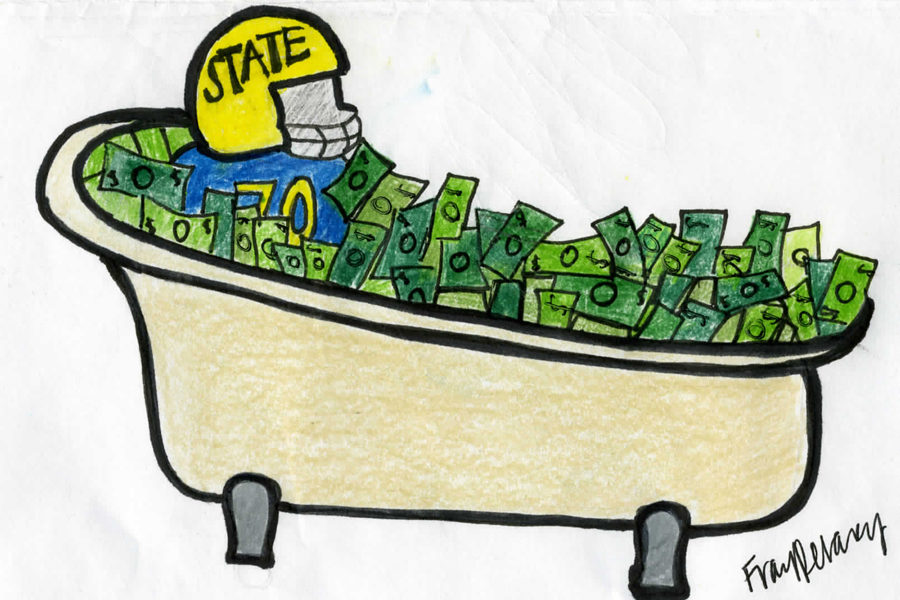Paying College Athletes: The Pricey Divide
Some student athletes take secret payments “under-the-table,” to convince them to go to a certain university.
May 1, 2017
It’s a debate you have probably heard about before. Should college athletes be paid for their play? Maybe you don’t know the specifics, but you’re aware that there’s a problem. Well, the specifics go like this.
Essentially, since the National Collegiate Athletic Association was founded in 1906, it has insisted on the principle of amateurism. In fact, the official NCAA website calls it a “bedrock principle” of the NCAA. Any athlete playing in the NCAA cannot be compensated in any manner for their play or the fame that their name has created, apart from their scholarships. Being prohibited from making money off of their name means that athletes can’t sell any merchandise with their name on it, take money for signing autographs, or get free food as a local celebrity because they had a good game last Saturday. There have been many occasions where players have taken secret payments “under-the-table,” or to convince them to go to a certain university. Players who are caught doing this can be suspended or stripped of former awards and commendations depending on the amount of the payments.
So why is this bad? Why can’t athletes just follow the rules and make the money when they get to the pros? They don’t have to pay a dime for a college education and that’s priceless, right?
There’s a story that former University of Tennessee running back Arian Foster likes to tell that illustrates a pretty solid image of a student athlete. He describes going back to his dorm after having a huge game one Saturday afternoon and being praised by everyone on campus, only to come back to an empty fridge with nothing to eat. Tennessee may have paid for his classes, but they didn’t pay for a meal plan, and that’s just the smallest of crimes the NCAA commits through amateurism.
Each reasonably sized university with an athletics department makes billions of dollars from athletics alone. A combination of ticket sales, boosters, tournaments and bowl games, TV contracts, advertising, merchandising, and more comes straight to the athletics department. The amount of revenue generated from athletics is based on team success: if the football team doesn’t make a bowl game, it doesn’t get the half a million dollar TV contract. Team success is dependent on player talent and athletic ability.
So how much is each player worth? Drexel University ran a study and found that in the 2011-2012 season, a Louisville basketball player had an average market value of $1.6 million. This means that each player on the Louisville basketball team was worth $1.6 million to the university. The value of the Louisville basketball scholarship that year was $17,370. Taking the difference between the two means, the NCAA siphoned a profit of $1,614,733 from each player. The same can be said for several other big name universities; Syracuse, Duke, and North Carolina all make six-figure profits off of each basketball player they have. Yet an athlete isn’t allowed to sell a t-shirt with their name on it for $5. The NCAA calls this “the spirit of the game,” amateurism.
While the NCAA administrators may not agree for fear of only making million dollar profits instead of billion dollar profits, it’s clear that the players deserve compensation for play. Unfortunately, it’s not as easy as just paying direct salaries like in professional sports. This could be very expensive if they were to pay every basketball player what they’re worth. It also could trigger Title IX lawsuits due to gender discrimination and would just be a very sticky situation.
Another proposal is to pay the athletes proportional to the revenue their sports generate. This means, hypothetically a quarterback would get the $100,000 stipend for football while a rower might get only $5,000 because rowing counts for a smaller percentage of revenue. Nope, it’s not that easy either. Tennis and volleyball on average generate no revenue for universities.
So what can we do? While the long-term solution may be very difficult, there is something the NCAA can quickly do to fix a huge ethical issue in amateurism. Let the players make money off their name. It’s their name and they have used their own talent to generate money. The least they can do is sell a jersey with their name printed on the back and collect a percentage of the profits. The NCAA again pulls the “spirit of the game” card to refute this. Well it’s time to pull the morality card. This is robbery. This is stealing. This is crime.
To conclude, the definition for an indentured servant: a person under contract to work for another person for a definite period of time in exchange for passage, education, or shelter.



